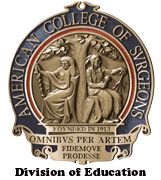Small Bowel Obstruction after Sleeve Gastrectomy Requiring Laparoscopic Diaphragmatic Hernia Repair with Mesh
Eugene Wang, MD; Fady P. Marji, MD; Ivanesa L. Pardo, MD, FACS

| Product Details | |
| Product ID: | ACS-5893 |
| Year Produced: | 2019 |
| Length: | 7 min. |
The patient is a 46 year old female with a history of morbid obesity, status post laparoscopic sleeve gastrectomy three years ago, complicated by a left diaphragmatic injury which was primarily repaired. She presented with emesis, obstipation, and left upper quadrant abdominal pain for several days. Computed tomography demonstrated a large left diaphragmatic hernia containing numerous loops of small and large bowel, and an associated jejunal obstruction. After nasogastric decompression, the patient was taken to the operating room for laparoscopic reduction of the hernia and diaphragmatic repair. Using one camera port and three working ports, the hernia contents were slowly reduced, which contained dilated small bowel with a transition point, cecum and appendix, as well as ascending, and transverse colon. All reduced bowel appeared viable. The hernia sac was dissected off the diaphragmatic defect using a harmonic scalpel, and the defect measured 7 cm x 2 cm. In the thorax, we noted a collapsed but healthy left lung which gradually expanded with ventilation and intermittent valsalva. A 16 French chest tube was placed in the left thorax, and the hernia defect was closed primarily with interrupted 0 Ethibond suture. A polytetrafluoroethylene mesh was secured over the primary repair for reinforcement. The nasogastric tube was removed on post-operative day one, the chest tube was removed on post-operative day two, and the patient's diet was advanced.



